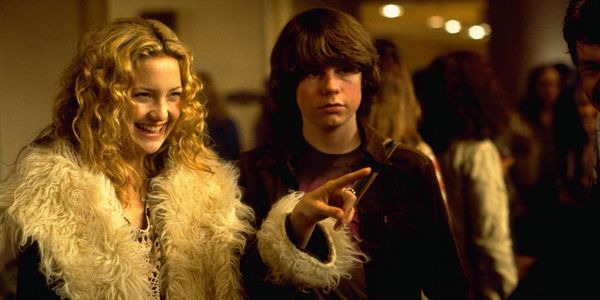Eye For Film >> Movies >> Almost Famous (2000) Film Review
Almost Famous
Reviewed by: Scott Macdonald

The medium of film can do many marvellous things to an audience, it can function as a time machine, perfectly transposing space and time for its spectators. Cameron Crowe's Almost Famous - the best film of 2000 - is much more than this: it exists as a time capsule, a perfectly formed box of treats, full of positive dreams, a little hope for the future and some of the finest rock music ever written. It's an immaculate little prayer for the youth and creators of our time.
Almost Famous is a largely autobiographical screenplay, and screenwriter Crowe is realised onscreen as William Miller, a mature 15-year-old. The casting of Patrick Fugit is central, since he's in pretty much in every single scene of the movie from 20 minutes in. Fugit effortlessly encompasses a nervous, precocious and completely and utterly "uncool" little man. He's as earnest as Atticus Finch in the namechecked To Kill A Mockingbird. He is a joy to watch, since the viewer wants to either mother him, or fully empathise with his plight and passions.

After a family dispute, Miller ends up with his sister's prized collection of music, which he dutifully absorbs and begins writing about in the school paper. The infamous Lester Bangs becomes a fan and befriends the boy, becoming a guardian angel in times of pressing need. Rolling Stone magazine contacts him and contracts him to write about an upcoming band called Stillwater - an amalgamation of several bands that Crowe wrote about during his time at Rolling Stone. Stillwater cheerfully dub him "The Enemy". And, with his brown coat, badly cut hair, and collection of satchel, tape-recorder and freshly nicked pads of paper, it's amusing to think of him going to war with them as weapons of his trade.
The film doesn't look expensive, but the sheer delight Crowe takes in the period detail is infectious. I found myself in quiet awe of the production design feat - all the fashions, homes and the perfectly realised period world.
We are introduced to a number of colourful characters, not least the vibrant and beautiful Kate Hudson as Penny Lane. I say beautiful not only because she is attractive, but also because her smile lights up the room - everyone in the room knows her, and they light up, too. It's little wonder that Miller falls helplessly for her, since the audience also finds it impossible not to. It's an amazing performance, in such complete command of the screen and people around her, that I'm disappointed I haven't seen her in anything even half as good as this film. Penny keeps him safe - from himself, and the band who exploit him to get good coverage.
The Stillwater band members are a cool bunch, with two main characters coming to the limelight. Billy Crudup, and Jason Lee taking the central acting chops as Russell Hammond and Jeff Bebe. Hammond is a potentially great musician, whose dedication to the band limits him and stops him from rising higher. Penny Lane is Hammond's Band-aide, a groupie with her own cultural and philosophical delusions with regards to sex. She loves him, he likes using her, and they and Miller form an uneasy triangle of mutual admiration, love and mild distaste. The actors are skilful and well-directed.
Their passion for music is felt throughout. Note the scene where Russell explains to Miller about a deliberate mistake in Marvin Gaye's "What's Happening Brother" and that it "makes the song!". The camera gently bounces back and forth between them, as they enthusiastically chat about the little things in it. Not 30 seconds later, we see him on stage playing Stillwater's Fever Dog, and he makes his own little "mistake". What a joy, something subtle, something that just makes the scene. Almost Famous is a love story about passions - the connections we make, and making people better.
Mrs. Miller (played wonderfully by Frances McDormand) worries, obsesses and frets about her son being poisoned by drugs and rock. "Your Mom really freaked me out!" becomes a great running gag, with her wholesome ideas about parenting, vegetarianism, and the annihilation of those counter-ideas which get in the way of this. Every good parent wants the best for their children. We learn in the opening 20 minutes that she educated William, and skipped several grades, much to his mild humiliation where he's about ready to leave high-school, much younger than everyone else. The isolation is evident.
Finding your friends and your place in the world is where Almost Famous finds it's soul. As I watched the film I wanted to enter it and talk to their characters, about their predicaments and dramas. That's the true test of whether movie characters are well drawn or not.
As the Rolling Stone deadline approaches, I felt my stomach tie in knots as time catches up with him, and that they finally realise who the person behind the remarkable articles really is. I found myself whispering consoling thoughts to Penny Lane, who was sold by Hammond as a bet for 50 dollars and a case of beer. Look at her acting, when told this by the infuriated Miller... just watch the way she goes through around six different emotions all at once. It's almost like the moment where Hannibal Lecter devastates Clarice Starling in Silence of the Lambs with coolly chosen insults.
Penny's response: "What kind of beer..?" That's acting.
But mostly, we feel the pulse of writer and director Cameron Crowe. His movie thrums with the overwhelming gratitude and singular pleasure of being able to do this at all. His movies are usually about a singular idea. His humble debut Say Anything thrums with the delight of young love, Jerry Maguire has it's underlying themes of doing the right thing, no matter the cost. Each of them has characters so finely drawn, that we feel that we could take them to dinner. We let these characters into our hearts, and love them for it.
Reviewed on: 05 Oct 2006


















